Fresh blisters are visible on the man’s hands.
The injuries are the result of a small fire that broke out in his New Westminster home the previous night.
His partner is still in hospital being treated for burns.
A person worried about the man’s well-being makes a phone call to a new service operating in the city whose mandate is to respond to people in crisis.
Fifteen minutes later, the man receives a knock at the door and welcomes in two members of New Westminster’s Peer Assisted Care Team, or PACT. They take a seat in his living room, explain who they are and how they can support him through the traumatic event.
“He let us in, we sat down and then basically for the next two hours, we just held space for him while he shared his story,” said Nicole Sto Thomas, the PACT coordinator for New Westminster, who attended the call.
“He really needed support to figure out next steps, and he kind of told us about his life story, and some other things that he was struggling with — and that he had no other support.”
The team followed up with the man and guided him to other services. He told Sto Thomas and her colleague how he wished PACT was available 10 years ago when he needed help.
“A lot of the folks we meet are just like, ‘Well, I would have either just kept on struggling a lot or tried to figure it out on my own,’” Sto Thomas said. “But that's really difficult to do, especially when something really impactful happens to you, and you're all out of sorts.”
The New Westminster PACT began operating in January. Victoria launched a team around the same time, following the lead of North Vancouver, which deployed the province’s first PACT in November 2021.
Another three teams are anticipated to launch within a couple months, and four others are in the works for 2024. Cities have yet to be announced, but the goal of the B.C. government, which funds the teams, is to spread them across the province.
The role of each PACT is spelled out in its name — pairing trained mental health professionals with people who have lived experience related to mental illness, addiction or homelessness to connect with citizens who need care.
Clients have ranged from teenagers to people in their 80s.
Circumstances that required PACT to connect have varied, but included people with thoughts of self-harm, traumatic events, family conflicts involving young people, seniors feeling socially isolated, people struggling with drugs and homelessness, tenants living in a precarious housing situation and the ongoing struggle for many of daily life.
Anxiety and depression have been common among clients.
The teams are not a new concept, with variations of the work being conducted in Toronto, Edmonton, Eugene, Ore., New Zealand and Sweden. The addition of the PACTs to B.C.’s continuum of mental health care has not been controversial.
500 calls to PACTs
At the same time, the push for more of them is often amplified in B.C. communities when there is a police call that involves a person in a crisis, who either gets injured or dies as a result of an interaction with officers.
That conversation continues, with clear answers not always evident: Do you send a non-police team to a bridge in the dark of night, where a large, aggressive man says he’s going to jump?
What about that same man wandering in traffic at a busy intersection?
Or behaving erratically in front of a business?
What’s clear is that all three PACTs in B.C. are responding to mental health calls that police aren’t attending — or police never knew existed because the teams are getting more widely known in New Westminster, North Vancouver and Victoria.
In New Westminster, for example, Sto Thomas could only recall one of the estimated 120 calls she and her six colleagues received since January that had to be referred to police because of concerns related to safety of the person and the public.
Across all three PACTs, the call load reached 500 between January and April, with police simultaneously present at six of the calls. There were only two calls where the teams required police to attend because of a risk to PACT members’ safety.
Eight calls were referred to the PACTs by police or the fire department.
“We have had feedback from folks saying that I'm glad that this program exists, otherwise we would have called police,” Sto Thomas said.
“I took a call personally from an anonymous caller worried about someone on the street, and he said, ‘I was going to call 911, but someone told me to call you guys.’ I was like, ‘OK, great, perfect, let us respond to this.’”
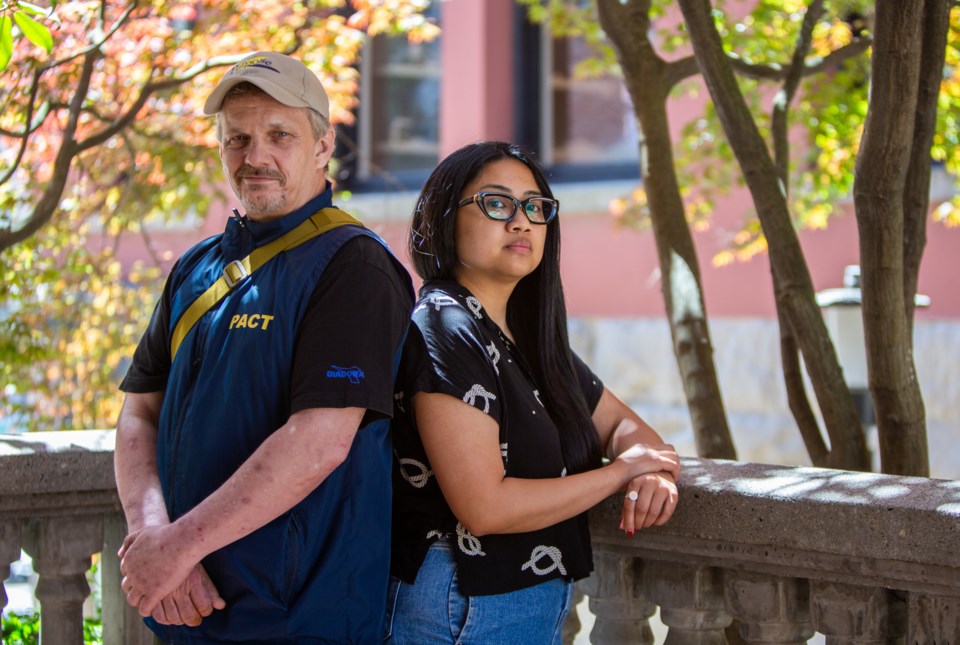
'I always wanted to kind of give back'
How they respond is in a nondescript Ford Flex.
Team members don’t wear uniforms, although a vest with the PACT acronym on it are available and was worn by Justin Snyder during an interview at the team’s headquarters at the non-profit Lower Mainland Purpose Society in New Westminster.
Sto Thomas is a social service professional, having worked in the areas of mental health, complex substance use and homelessness for 10 years. At one time, she led a housing outreach team, with much of her experience in Vancouver.
Snyder is a former pilot, construction worker and was a team leader of the shelter at the former Army and Navy store on Columbia Street until he joined PACT. For a time, he struggled with addiction and is now committed to helping people with a way forward.
“I got help through non-profits like this, and I always wanted to kind of give back,” he said.
A lot of what Sto Thomas and Snyder do is help people navigate what is a patchwork of social services in the province, where, for example, a technology-challenged senior in crisis is at a disadvantage.
Guiding people to or connecting them with treatment services, housing or counselling, along with escorting clients to medical appointments — as Snyder did recently in a trip to a hospital — has been part of the job.
Anyone 13 or older can call a PACT.
“We literally meet you where you’re at,” Sto Thomas said. “So you don't need a referral from a doctor, you don't need to be connected to another team. You could just call us, and we'll help you.”
'It only compounds their crisis'
What she and Snyder have heard in the past six months is that the pandemic has hit people hard and many continue to be concerned about food security, the cost of rent and finding an affordable place to live.
They estimated more than 50 per cent of their clients have housing.
Hearing and addressing those concerns, they said, can be difficult in B.C., where homelessness continues to increase and more people are living in precarious housing situations. Some of their clients are fighting evictions through the Residential Tenancy Branch.
“It only compounds their crisis, especially with some on fixed pensions and incomes,” Snyder said. “PACT is a needed resource in the community, but also what needs to happen along with us is there has to be, for instance, more housing and other resources put in place so that we can access them for our clients.”
Added Sto Thomas: “It’s challenging when you have to tell a person, ‘OK, we’ve got you connected to this team, but the wait list is eight months. So how can we plan with you to make sure that you have a safety plan in place, and you're feeling OK day to day before you get access to that team.’”
The hardships shared by clients are top of mind for the team.
“We try to keep note of that because I think that's where our team can really play a big role in advocacy,” she said.
“We could tell funders and other people, ‘Hey, our team sees people every day in crisis, and these are X, Y and Z that always come up, and are really difficult to address because a service doesn't exist, or there's a gap there.’”
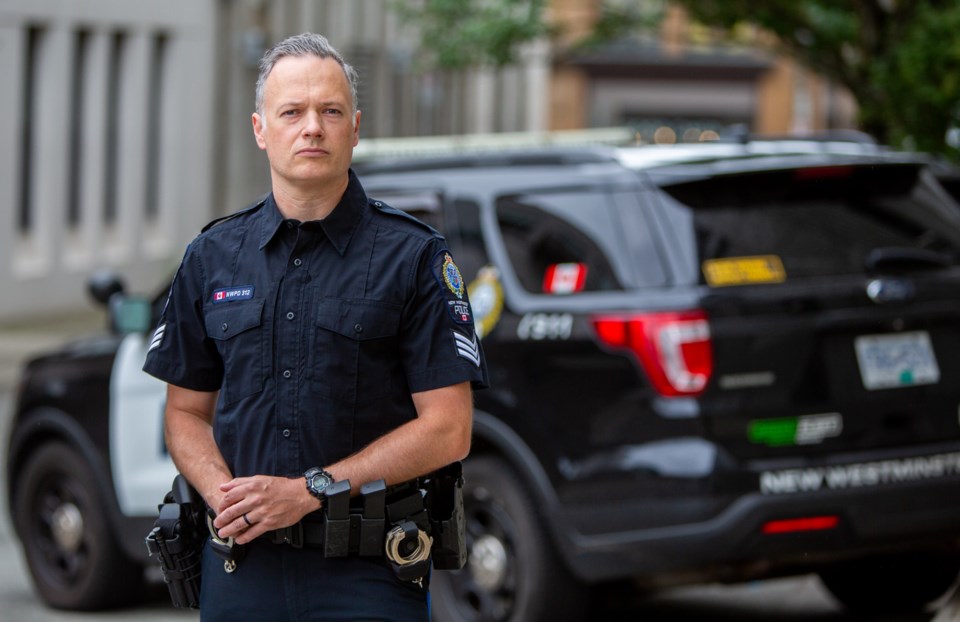
'Police don't even need to be involved'
Police in New Westminster have welcomed the PACT.
Sgt. Andrew Leaver, a media relations officer for the department, said PACT has liaised with NWPD’s mental health unit, and officers across the city know to refer citizens to the team, if there is a need from a person that police can’t fulfil.
“It does fill a gap in the sense that there are times that the PACT is called and the police don't even need to be involved, or wouldn't even know about it,” Leaver said.
“So there's people in our city that are getting the support they need, without taking a police officer off the street.”
Not everyone in crisis, he continued, needs the police.
“Not everyone in crisis is necessarily suicidal, not everyone in crisis is committing an offence in that crisis,” Leaver said.
“Those are the times that the police have to attend and ultimately deal with a situation, but there are those instances where people would benefit more so from just having a peer and a mental health professional come and talk to them.”
Data from the NWPD shows an interesting pattern has developed this year since PACT began operating in January. The number of apprehensions police made under the Mental Health Act between January and May was 99.
That is a significant drop from the same period in 2022 (146) and 2021 (192). Match those 99 apprehensions against the 120 calls that PACT responded to over five-and-a-half months and the reaction from Leaver comes in three words: “That’s good news.”
But there are variables to the data: PACT only operates in New Westminster from noon until 8 p.m. (seven days a week) and apprehensions under the Mental Health Act are not connected to calls where a crime is committed and has a mental health component to it.
Police use the Mental Health Act to apprehend — not arrest — people who present a danger to themselves or the public. They are then transported to a hospital, where they are assessed by a doctor.
Leaver described New Westminster as "unique" when it comes to mental health-related calls: the city is home to Royal Columbian Hospital, where a large mental health facility exists on the same campus.
Calls involving missing persons and suicidal people are common for New Westminster officers, Leaver said.
"Sometimes those missing persons actually can be suicidal, as well," he said. "And that obviously changes our response to them. But both of those are very high risk for us; we do have a great deal of missing persons files in the city, as well as suicides. I think that's just as a result of the environment that we're in here in New Westminster [with various mental health facilities and services]."
Sto Thomas said the goal is to expand the PACT to a 24/7 operation and add more staff, which would likely mean further contact with people in crisis throughout the late evening and early morning.
But there will be — and have been — calls the PACT will not attend.
“Any type of extreme risk to self or others, we would call 911,” Sto Thomas said. “We try our best to have that be the absolute last resort because the point of our program is to be an alternative to policing.”
Which is a point Leaver elaborated on, when asked what calls police should attend or leave to PACT.
“I'd say anything ultimately life threatening related to the person in crisis, like suicidal, homicidal, in an active psychosis, actively withdrawing from something, hallucinating, has access to weapons — those types of things would be something that the police should attend alone,” he said, emphasizing the end goal is to provide the most appropriate response to a person in crisis, which can be a fluid situation because police don’t always know whether mental health is involved in a call until they arrive at the scene.
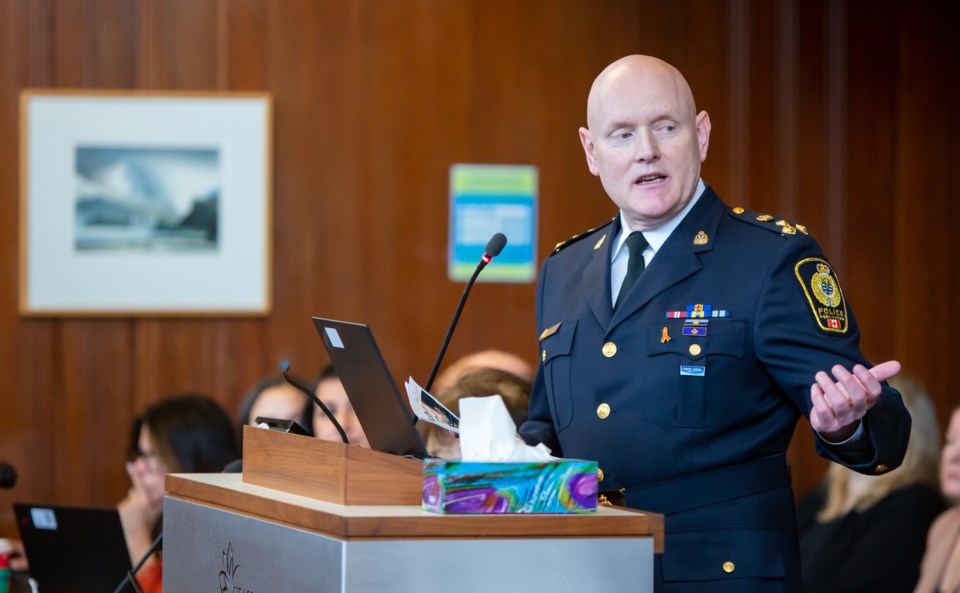
Mental Health Act apprehensions
If there is one city in B.C. where a PACT would seem to benefit citizens, mental health care advocates might choose Vancouver.
Police in that city have apprehended an average of 4,632 people under the Mental Health Act over the past nine years.
That includes apprehending one person 79 times in four years.
In 2022, the Vancouver Police Department conducted an analysis on assaults committed by people not known to the victim and found that mental health was a contributing factor in 73 per cent of 44 cases.
Of the 44 “stranger assaults,” 53 per cent involved a suspect who had been previously apprehended by police under the Mental Health Act.
Police Chief Adam Palmer is well aware of the statistics and patterns, but didn’t seem convinced when asked last week whether a PACT was needed in Vancouver.
“There's a very small number of calls that VPD actually attends that we shouldn't attend — it's like a handful per day out of the 700 calls for service we get,” said Palmer, estimating the “small number” as six calls, with an example being a person wandering in traffic at 3 a.m.
The chief said Vancouver already has a variety of mental health services in place that smaller communities don’t have. He pointed to outreach teams, street nurses, overdose outreach workers, the Strathcona Mental Health Team and the Access Centre at Vancouver General Hospital.
He also noted that city council’s commitment in February to unlock several million dollars for Vancouver Coastal Health to hire 58 mental health workers will enhance those services. In addition, the VPD has its own mental health teams, including the Car 87/88 programs, which pair plainclothes officers with psychiatric nurses.
Glacier Media: “So if the Minister of Mental Health and Addictions came to you and said we'd like to put a PACT in Vancouver, what would you tell her?”
Palmer: “It's already coming, it's already happening. That’s part of the mental health program that's being built out because of the council approval. So it's already underway.”
Told of the New Westminster PACT’s call load reaching 120 this year, the chief said police in that city are going to calls that officers would never go to in Vancouver.
“So they will be going into those minor calls like somebody walking down the street talking to themselves, somebody in a minor sort of crisis,” he said. “We don't ever go to those calls. We go to the more serious calls.”
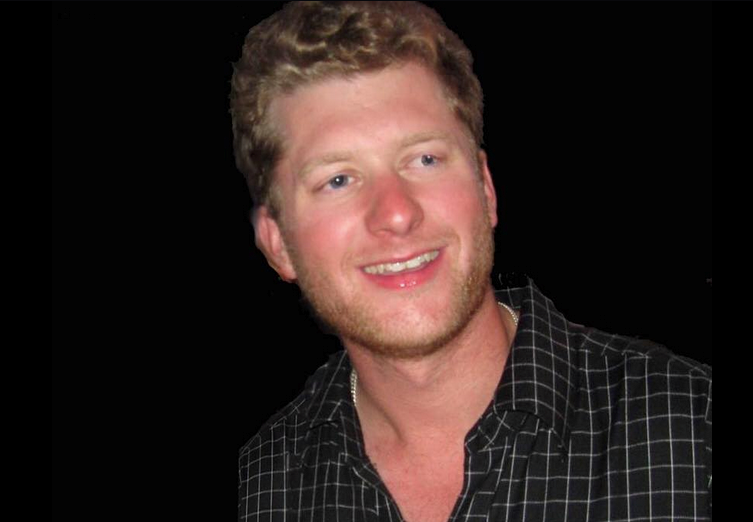
'It was the right call to send the police'
Palmer answered Glacier Media’s questions after a police board meeting, where a report went before the board on the VPD’s response to the coroner’s jury recommendations regarding the death of Myles Gray in August 2015.
Gray, 33, died after an interaction with several officers who responded to a call of a man spraying a woman with a garden hose in the 8300-block of Joffre Avenue in Burnaby, near the Vancouver border.
Gray, who lived on the Sunshine Coast at the time, was in Burnaby to make a delivery from his florist business. The person who called 911 was the son of the woman being sprayed with the hose.
He described Gray as “agitated and disturbed with incoherent speech,” according to a statement in December 2020 from the BC Prosecution Service, which said Gray went into cardiac arrest and died after being put in hand and leg restraints.
The jury classified Gray’s death as a homicide.
The BC Prosecution Service, which didn’t approve charges against the officers, said that a post-mortem examination found Gray suffered a broken orbital bone, broken nose, broken throat cartilage, broken rib, ruptured testicles, bruising to his body and face and a possible partial dislocated jaw.
In response to the jury’s recommendation, the VPD says it will equip officers with body cameras and enhance its de-escalation training.
Eight years after Gray’s death, his family is still perplexed at how their son and brother could die at the hands of police.
Should police have gone to the call?
Palmer didn’t hesitate in answering the question.
“I can say that definitively that 100 per cent it was the right call to send the police because somebody was assaulted,” he said. “It's a criminal offence, you had to send police to that.”
'Everybody has a fragile, weak moment in life'
Gray’s mother, Margie, and his sister, Melissa, have called for the officers to be fired.
At a news conference in April outside the inquest, Melissa told reporters that police need training on how to assess a situation when a person is in crisis, like her brother clearly was on the day he died.
“If someone’s having a mental health crisis, and they aren’t wearing shoes and they aren’t wearing a shirt, they should be able to identify that and they should treat them more humanely,” she said, referring to evidence that her brother was shirtless and without his boots when police arrived on scene.
Melissa testified at the inquest that her brother was diagnosed with bipolar disorder when he was in high school. She believed his condition was stable until the incident with police unfolded in 2015.
The Grays are supporters of non-police intervention teams such as PACTs, and say more are needed in the province to avoid police-involved deaths.
“That’s 100 per cent what needs to happen,” Margie said. “I mean, everybody has a fragile, weak moment in life, and [a police response] is not what we need. We need people that will help us. You don't call the police if you have a broken leg. Your brain is an organ, it's about health, it's mental health. So why are we calling police?”
Her daughter pointed to the value of having a person with lived experience as a member of a PACT.
“They know how it feels to be going through [an episode] and how to help those people,” Melissa said. “They don't need to be thrown to the ground, they need to be helped, they need to be talked to. Rather than throw money at the police, put it towards these other avenues.”
'A life was absolutely saved'
Jonny Morris, the CEO of the Canadian Mental Health Association’s B.C. division, expressed much of that sentiment when he spoke in May 2022 at a public safety forum organized by Vancouver city council.
Morris said studies have shown for years that most people with a mental illness are not violent and that most people who are violent do not have a mental illness.
“I live with a mental illness and I'm not violent,” Morris said at the time. “I have people in my workplace who live with mental illnesses and they’re not violent.”
Morris shared his personal situation while stressing the importance for media and “influential leaders” to reduce the stigma of mental illness and its often incorrect link to violence.
It is his organization that spearheaded the implementation of the PACTs in B.C. and now oversees them.
“We've long held the view that we really need to minimize the occasions and circumstances where someone in a mental health crisis is in contact with the police,” Morris said in an interview this month.
Morris said the cost of each PACT has been budgeted for roughly $1.9 million per year, a cost he said that brings good value when considering the expense of sending police, paramedics, firefighters or all three services to one call.
Then there could be hospital costs on top of that.
In Victoria, for example, the PACT has handled several calls related to suicide.
“The Victoria team are actually responding to very significant high acuity suicide risk situations, and they've had some very, very positive outcomes,” Morris said.
“There's a number of stories of them being able to get people de-escalated and connected to followup care.”
One story in particular brought Morris to tears.
The background: An older adult, isolated in their home, has thoughts of self-harm. The person lost their husband to suicide. The person calls a health service in the community, but is told they can’t help. The person calls PACT out of curiosity.
Members arrive, spend seven hours over two shifts with this person — and with the client’s permission — make a call to the person’s family. (Other details of the call are not being shared by Glacier Media to protect the person's privacy and identity.)
“That person is now safe,” Morris said. “I know there's lots of caring people in the health authority, and I know there is caring people in policing, but it's an inflexible system. It doesn't do that level of response. It can't. But in this moment, I'd say safely that a life was absolutely saved.”
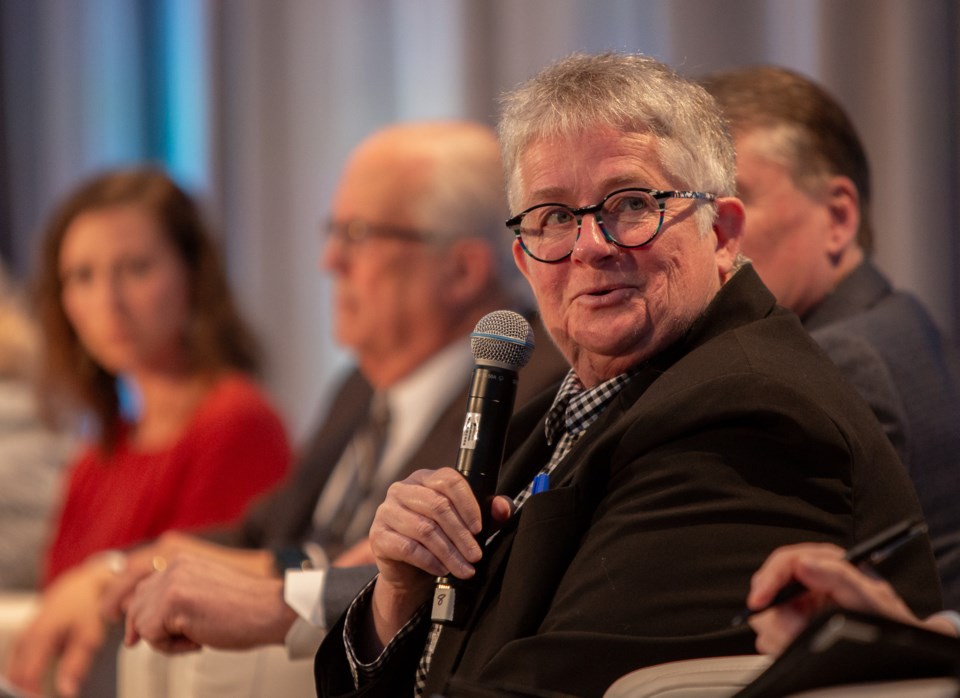
'You don't hit every nail with a really giant hammer'
It’s a story that Victoria Mayor Marianne Alto said validates the need for such teams.
Before she was elected mayor last fall, Alto served as a councillor and pushed — along with then-councillor Sarah Potts — for a community-led approach to helping people in crisis.
“That's a great example — that story is exactly the type of thing that I imagined that the PACT team would actually do,” said Alto, who sees the concept as part of a continuum of care that benefits community and reduces the workload for police.
She said when Victoria Police Chief Del Manak gives council updates every quarter, he talks “frequently, if not every time” about how much time police spend responding to people in crisis with no connection to a crime.
“There's a real, honest debate going on about whether or not it should be taking up police time,” she said, before mentioning the Car 87 program that exists in Vancouver, where a psychiatric nurse is paired with an officer in plainclothes; Victoria Police Department has also launched the service.
That program, she continued, fills a spot between an all-out police response and one from PACT.
“All these things are incredibly important because we're really trying to be a lot more sophisticated and a lot more nuanced in how we respond to community crisis — and not just think that we have kind of a one-size-fits-all kind of thing, which we've clearly shown over the years doesn't work,” the mayor said.
Added Alto: “You don't hit every nail with a really giant hammer. Sometimes you need to have something that's smaller and more delicate.”
While there is excitement in the community about the team’s successes, Alto said there still needs to be a commitment from the provincial government to make the three PACTs permanent and expand the program across B.C.
“Unless something dramatically different happens from what I'm hearing — as far as its success rate and its capacity and its utility — I would hope it would become a permanent option,” she said.
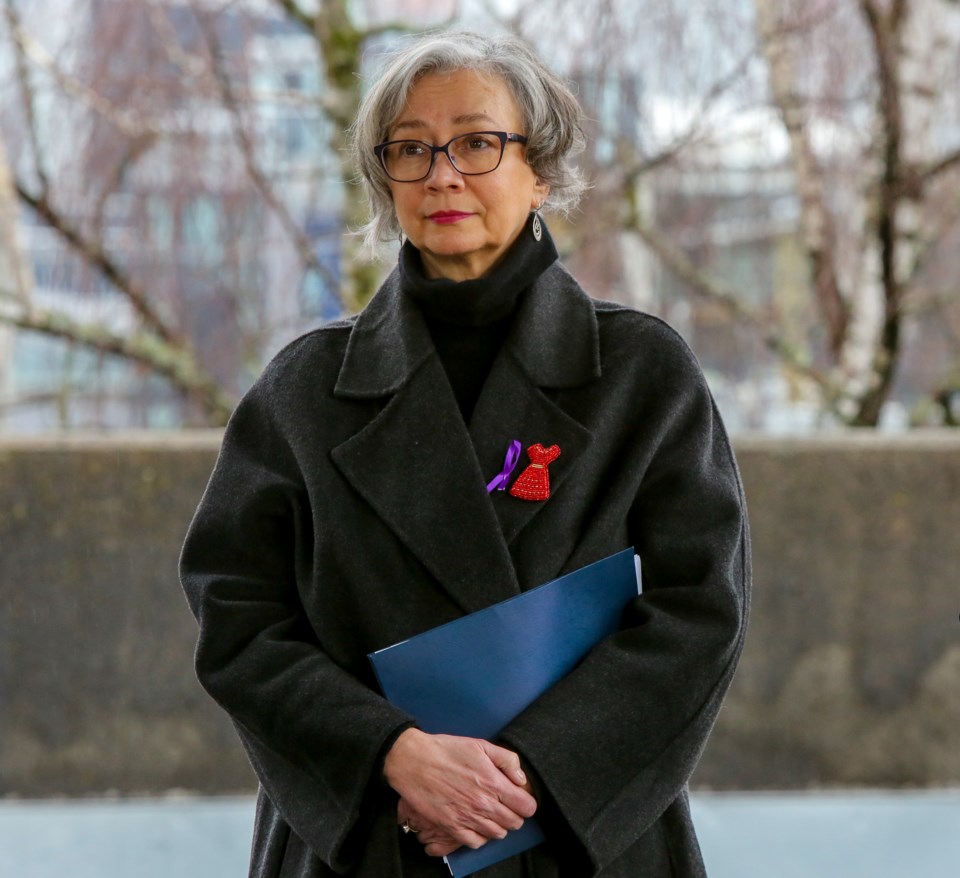
'I wouldn't rule any community out'
That’s a call that Jennifer Whiteside, the Minister of Mental Health and Addictions, will have to make.
When asked June 7 whether the existing three teams will become permanent, Whiteside didn’t provide a clear answer, but said that government was “well on our way” with assessing the outcomes of the first PACT deployed in North Vancouver.
A followup email Wednesday to her ministry confirmed the three teams "are now a permanent addition to our community outreach and response services."
Three more teams will be announced within the next couple of months and are likely to be launched in B.C.’s Interior and the North, but Whiteside wouldn’t reveal the cities. The government has also promised to have some teams that are Indigenous-led.
“I wouldn't rule any community out, but we're really looking right now at understanding how the current [PACTs] are working, and then how we might grow that program and apply that program,” she said.
Whiteside emphasized PACTs are not designed to replace the work of police.
“Not, not at all, it's really meant to ensure that police resources are directed appropriately to the work that we need them to be doing,” she said.
“But there are times when absolutely police need to be involved because there may be violence attached to behaviour that somebody who is in crisis is exhibiting.”
As a New Westminster MLA, Whiteside said she has only heard “positive things” from that city’s police department about the work PACT is doing in the community.
“My understanding is that this is really filling a gap that is really very much needed on the ground,” she said.
'A journey for me'
Meanwhile, back at the New Westminster PACT’s office, Sto Thomas and Snyder took a moment to reflect on the work they do, which they admit can be challenging and emotionally draining.
But they both know that comes with the job.
Snyder: “It’s kind of like a journey for me. I like the connection with people and getting to know them and what their struggles are, and then maybe seeing them later on, and they're doing a lot better, maybe they're doing worse. But just the journey and the teamwork that we do is exciting.”
Sto Thomas: “It's really great just to be able to be a part of making mental health care more accessible for folks that that need it and want it. And it’s really fulfilling to be able to support folks in a true and genuine way, and literally and figuratively meet them where they’re at, with no judgments.”
Note: If you or someone you know is in need of services from a PACT, the phone numbers are as follows: New Westminster (778-727-3909), North Vancouver (1-888-261-7228, or text 778-839-1831) and Victoria (250-818-2454); the service in North Vancouver is available in English and Farsi.




